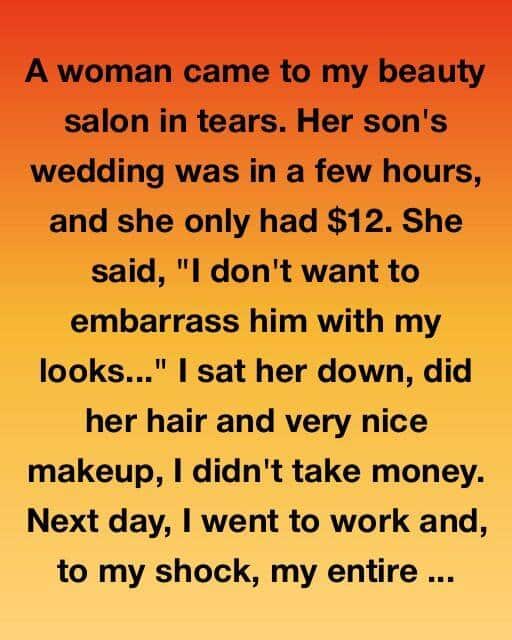When I turned the mirror toward her, she gasped. For a moment, she just stared. Then her face broke open into a smile so bright it stopped me cold. “Oh,” she whispered, eyes glistening. “I look like me again.”
She tried to hand me the twelve dollars, but I closed her hand around it and said, “You already paid. Go enjoy the wedding.”
That day came and went, but I couldn’t stop thinking about her. Something about the way she carried both grief and grace stayed with me.
The next morning, when I unlocked the salon, I froze. The doorway was buried in flowers—roses, lilies, wild blooms spilling from mason jars. The air smelled like honey and spring. Tucked inside one bouquet was a small card that said only: Thank you for seeing me.
I cried right there in the doorway.
A few days later, a young couple walked into the salon. “You did my mother’s hair,” the man said. “I’m Daniel. This is my wife, Clara.”
They explained that Mirela had told them everything, and that the flowers were from them—paid for with their wedding gift money. Clara’s eyes glistened as she spoke. “She said you gave her back that day,” she said softly. “You helped her find herself again.”
We talked for hours. They invited me to dinner that weekend, and I went. Mirela was there—radiant, laughing, alive in a way she hadn’t been before. When we hugged goodbye, she whispered, “You gave me more than a hairstyle. You gave me courage to show up.”
That night, I couldn’t sleep. I kept thinking about what she said. Most people walk into my salon wanting a haircut, a color, a change. But some of them need something deeper—to feel seen. To feel human again.
A few weeks later, Mirela’s cousin called. She’d heard what happened and asked if I could help her neighbor—a widower who hadn’t left his house since his wife passed. I said yes.
He came in quiet and lost. I trimmed his hair, shaped his beard, and just let him talk. He told me about his wife’s laugh, how he still heard it in the mornings. When he left, he caught his reflection in the mirror, straightened his posture, and smiled—just a little. It was enough.
Word spread. Soon, people started coming in not just for style, but for hope. So, I made it official. One day a month, I’d offer free services for seniors, single parents, or anyone struggling. I called it Give Back Day.
At first, it was just me. Then clients started leaving extra tips with notes saying, “Use this for someone who needs it.” Others dropped off supplies—brushes, hair color, hand cream. My little idea grew into something bigger than I ever imagined.
One of my regulars, a lawyer, helped me turn it into a nonprofit. We called it The Mirror Project. The idea was simple: restoring someone’s reflection to help restore their spirit.
Soon, other salons joined in. We partnered with shelters, cancer centers, and nursing homes. Every month, stylists volunteered to give free cuts, manicures, or makeovers. We weren’t just changing appearances—we were rebuilding confidence, dignity, and connection.
And it all began with Mirela.
Months later, I got a letter in shaky handwriting. The return address read “M. Roche.”
“Dear Sofia,” it began.
“You may not remember me right away, but I’ll never forget you. After a long battle with cancer, I’m finally in remission. When I looked in the mirror this morning, I saw hope—and I thought of you. You didn’t just make me beautiful that day. You made me feel alive again.”
I must have read it a dozen times before framing it and hanging it near my station. It reminds me every day why I do this.
People think salons are about vanity. About keeping up appearances. But it’s not. It’s about dignity. It’s about kindness. It’s about reminding someone they still matter, even when life has worn them down.
A mirror doesn’t just show a face—it reflects the soul staring back. And sometimes, with a little light and care, that reflection can spark something powerful.
Every time I pick up my scissors now, I think of Mirela’s trembling hands and her quiet, astonished smile. She walked in with twelve dollars and a heart full of worry. She left with something priceless—hope.
And in return, she gave me something I never expected: purpose.
Every person I touch, every smile that blooms in that mirror, carries a piece of her with it—the woman who reminded me that beauty, at its truest, isn’t what we see. It’s what we give.

